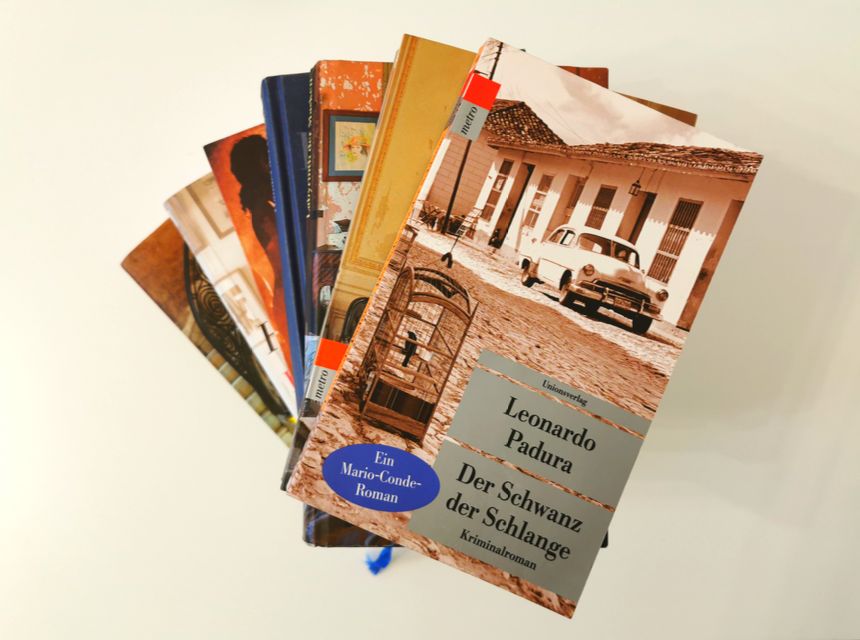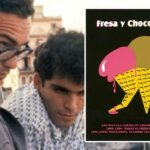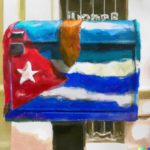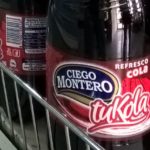Leonardo Padura’s Detective Mario Conde Investigates Cuba’s Special Period
We’re still stuck in lockdown, and all we can do is read about Cuba, our beautiful island. Recently, several readers have pointed me to some great books about Cuba and asked if I could introduce a few. So, let’s start with the most famous ones, the “Havana Quartet” by Leonardo Padura. And for those interested in film adaptations: yes, the “Havana Quartet” has also been brilliantly adapted into films. 😉
What’s the “Havana Quartet” About?
Mario Conde, a detective, a failed writer, and a great thinker, investigates tricky cases in Havana. Most of the time, the stories revolve around the misdeeds of the powerful: corruption, drugs, murder, and hate.
Crime Novels in the Style of Hammett or Chandler, But Set in Cuba
The novels are reminiscent of the classic film noir tales by Dashiell Hammett or Raymond Chandler, famously adapted into movies starring Humphrey Bogart. However, Padura’s books delve deeper on two levels: not only do they provide a fleeting image of the society in which the detective moves, but socialist Cuba, especially during the Special Period, always plays a central role. Padura also explores deeper intellectual and human levels, such as when Mario Conde delves into the psychological and societal aspects of a transvestite’s role. He goes further than the classic genre ever did.
Mario Conde, Lieutenant of the Havana Criminal Police
The novels follow Mario Conde, a detective haunted by many ghosts, and his group of friends who grew up together in La Vibora, Havana. Mario is actually too intellectual for police work and dreams of becoming a writer. Over time, traced from book to book, he gradually distances himself from his job as a lieutenant in the Havana police force. His quest for truth, getting to the bottom of things, and bringing perpetrators to justice are his driving forces. Rum, passion, and the futility of the “hidden generation” run through all the novels.
Mario Conde usually has to investigate very carefully against the big shots of society, whose children have been killed, whose corpses appear castrated, or who might have stashed away money.
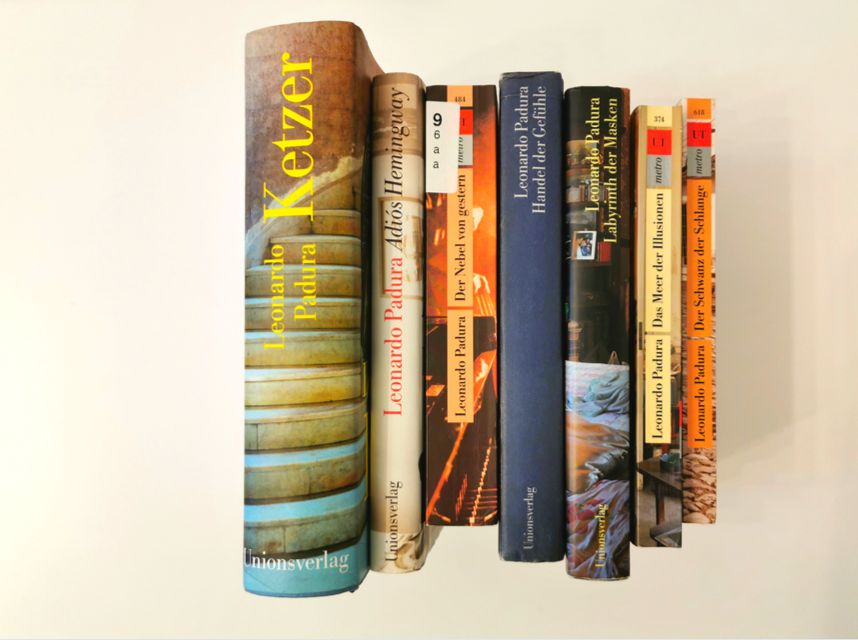
The Books Featuring Mario Conde in Order of Publication
The Havana Quartet (“Las cuatro estaciones”)
1. Havana Blue (“Pasado Perfecto”), 1991, Winter: Mario Conde investigates the disappearance of a high-ranking official whose spotless reputation might not be as clean as it seems. This also brings him back into contact with Tamara, his youth love and the wife of the missing man.
2. Havana Gold (“Vientos de Cuaresma”), 1994, Spring: A young, beautiful teacher from his former school has been murdered, and traces of marijuana are found in her apartment. Is it a drug-related crime or is there more to it?
3. Havana Red (“Máscaras”), 1997, Summer: A murdered transvestite is found. Was it a hate crime? But why didn’t he resist when he was being killed?
4. Havana Black (“Paisaje de otoño”), 1998, Autumn: A high-ranking official who fled Cuba 11 years ago returns to the island and is found murdered shortly after. Was it about money, revenge, or his wife?
Other Books Featuring Mario Conde
After the four books of the Quartet, Leonardo Padura couldn’t let his Mario Conde rest and had him continue investigating in several more cases:
5. Adios Hemingway (“Adiós Hemingway”), 2001: Mario Conde is unofficially reactivated to quietly solve a murder at Hemingway’s Finca Vigia – a murder that happened during Hemingway’s time! Adios Hemingway is both a novel and a biography of Hemingway.
6. Havana Fever (“La neblina del ayer”), 2005: By chance, Conde follows a 300-year-old trail of the Bolero when he comes across an article about the singer Violeta del Rio, who ended her career and shortly thereafter died a violent death.
7. Grab the Snake by the Tail (“La cola de la serpiente”), 2011: In Barrio Chino, a murder has occurred that might be a ritual killing. Mario Conde aims to get to the bottom of it, introducing us to Cuba’s Chinese past in the process.
8. Heretics (“Herejes”), 2013: In 1939, the MS St. Louis, with 937 Jews on board, is denied entry to Havana, condemning many passengers to continue their journey, some to their deaths. But what’s the story behind the Rembrandt that might have ended up in Cuba? Padura delves into the tragedy of the MS St. Louis while also taking us to medieval Europe.
9. The Transparency of Time (“La transparencia del tiempo”), 2018: Conde sets off in search of the Black Madonna for his friend Bobby, a statue that had traveled from the Pyrenees to Cuba over time. His search leads him to the slums on the outskirts of Havana.
10. A new book is in preparation, which will be set during the pandemic.
In general, Mario Conde ages with each book and is always 2-3 years younger than Leonardo Padura.
About Leonardo Padura
Leonardo Padura, whose full name is Leonardo de la Caridad Padura Fuentes, was born in Havana in 1955 and studied literature. His literary knowledge shines through, especially in “Adios Hemingway,” but also in the various literary and writerly musings of Mario Conde.
The Mario Conde series is his greatest success, though he has written other books and essays. With the Mario Conde series, he has won numerous national and international awards.
Mario Conde shares certain parallels with Padura himself, though Conde is a year older. The books follow the time in which they were written and reflect current developments. We can eagerly anticipate the upcoming novel, which will incorporate experiences from the pandemic.
Naturally, all of Padura’s books are deeply rooted in Cuba, as they wouldn’t work without this setting: the daily struggles, rum and cigars, real socialism, corruption, and passion are always the ingredients that make his novels stand out from the crowd.
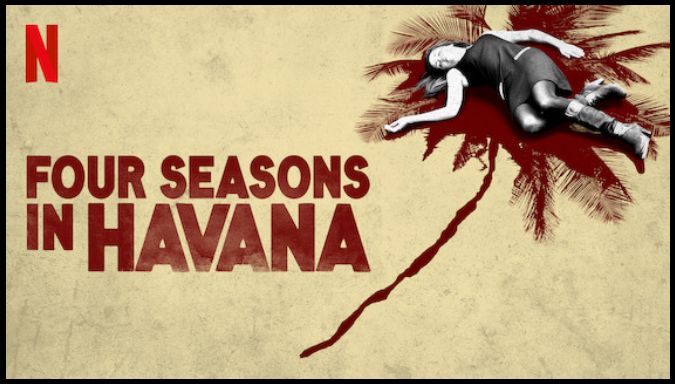
The 4 Films Based on the Novels
For those of you who think reading is so twentieth century, don’t worry. “The Havana Quartet” is also available as a four-part film series. Naturally, given my age, I’m more of a fan of the books, but the series definitely captures that indescribable Cuban feeling of longing, loss, and heat, that typical Cuban melancholy in beautiful imagery.
The lead actor, Jorge Perugorría, whom we know from “Strawberry and Chocolate,” plays the role of Mario Conde masterfully. However, I had a completely different image of Mario Conde in my mind, so it took me some time to get used to his portrayal.
The four films follow the novels but have been adapted to the film format by Leonardo Padura himself, so they align with his vision. The films are set in an indeterminate time period, much like Cuba itself seems frozen in time. Only the absence of cell phones and reggaeton hints that the timeframe is the same as in the books.
If you plan to both read the books and watch the films, I recommend starting with the books, as is often suggested. And for those who aren’t fluent in (Cuban) Spanish, I recommend watching the films in the original language with subtitles.
Where to Find the Books
If you want to read or listen to more of Leonardo Padura, you’ll find plenty on the internet. A good start is Archive.org, where you can find a wealth of Padura’s books to read and download.
Also interesting is the Instituto Cervantes, the Spanish cultural institute. With an affordable membership, you can access a huge collection of Spanish-language audiobooks, including those by Leonardo Padura.
And don’t forget your local libraries—they likely have Padura’s books, perhaps even in electronic formats like audiobooks and eBooks! And of course, there’s always Amazon. 😉
Conclusion: The Havana Quartet, Absolutely Worth Reading
If, like me, you find yourself longing for Cuba, then go and get the books about Mario Conde. They will captivate you and not let go anytime soon. While researching, I realized that I had missed two books in the series—the others I have read and listened to multiple times. So, I know exactly what I’ll be doing for the next few days: binge reading. 😉
Do you have any book recommendations to satisfy our Cuban longing? If so, please share them, ideally with a short review that I can feature here—bring on your book ideas!
Saludos from gray Berlin,
Cheers Dietmar
